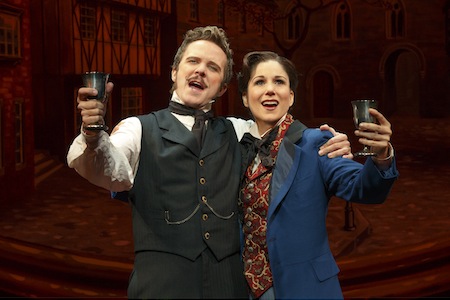Dickens's "Drood" is a Winner

The Mystery of Edwin Drood
Studio 54
W. 54th Street
New York, N.Y.
The Mystery of Edwin Drood, a musical based on Charles Dickens’ last, unfinished novel, does not start; it erupts. Characters from the cast entertain people in the audience and, as the festivites continue, the noise level rises until you cannot distinguish it from Grand Central Station at rush hour. Then the play, a merry romp through 1895 England, begins to unfold.
Edwin Drood was a dashing young man in love with gorgeous blondie Rosa Bud. He disappeared on Christmas Eve, 1895, and was assumed murdered. The play recounts his story, until his demise, and then, in act two, the cast works with the audience to decide who killed poor Edwin.
Dickens was about three quarters of the way through The Mystery of Edwin Drood when he died. Rupert Holmes then revised all of it for his 1986 play, revived again last week at Studio 54 in New York, the notorious 1970s hot spot where Liza Minelli, Truman Capote and Bianca Jagger held court and everybody who was anybody danced the night away.
The play is a delight, a barrel of historical fun, a carnival of nineteenth century skits and spoofs. Director Scott Ellis has turned the Dickens novel and Holmes musical into frenetic somersaults through a bawdy 19th century British music hall just outside of London, the Music Hall Royale. The cast careens through a succession of plots and subplots in act one, culminating with the murder of Edwin. Drood himself, a delightful young chap played by a woman, the enormously talented Stephanie Block. The cross dressing Block is madly in love with Miss Bud, who spends most of the play sashaying through the streets of London, swinging her bottom from side to side. Ru Paul, eat your heart out.
The musical is a chocolate cake of a show, a wonderful two hour parade through England at the end of the 19th century and a healthy, and unhealthy, look at the people who lived there. It is full of boisterous songs, one bawdier than the other, and the entire enterprise is directed by an old hand at carny entertainment the fantasmagoric chairman of the music hall, William Cartwright, played with outrageous abandon by Jim Norton.
The stock musical format fades away by the beginning of act two, replaced smoothly by the historic music hall setting, complete with every kind of character you can imagine.
Who killed Edwin Drood? It depends on what night you see the show. The audience votes for its favorite homicidal maniac at the end of the play and each night the killer is a different character.
The vote for the killer is just part of the broad-based audience participation in the show. You can hoot and howl, whistle , cheer and jeer all you like. The actors encourage it, arms waving and feet banging on the stage. The Mystery of Edwin Drood is an explosion of good natured fun. Never was a murder investigation conducted with such frivolity and joy. You would never see this in a Law and Order episode.
Set designer Ann Louiszo shas done a fine job of recreating churches, mansions, streets, squares and graveyards of England at the turn of the century. The architecture in the play is a nice recreation of the way England looked back then. William Ivey Long has done the same fine work in recreating the clothing of the era, down to shawls and top hats. In dialogue, you learn much about the town where the murder took place, Cloisterham, and London itself. There is a lot of subplot about Indians (well, the couple is from Ceylon), who were a vibrant immigrant group in Great Britain at the time. You learn a great deal about the crime wave in London at that time, just a decade after Jack the Ripper ran wild.
Director Ellis received fine work from Miss Block as Drood, and exemplary work from Will Chase as John Jaspers, Edwin’s uncle and rival for the hand of the delectable Rosa Bud, Betsy Wolfe as Rosa, Jessie Mueller as Helen Landless, one of the visitors from Ceylon, and Andy Karl as Neville Landless, her twin brother, are all impressive. Other fine performances were from Gregg Edelman as the Rev. Crisparkle, Robert Creighton as Durdles, Peter Benson as Bazzard and, as an extra added attraction, Broadway legend Chita Rivera as the amiable Princes Puffer.
